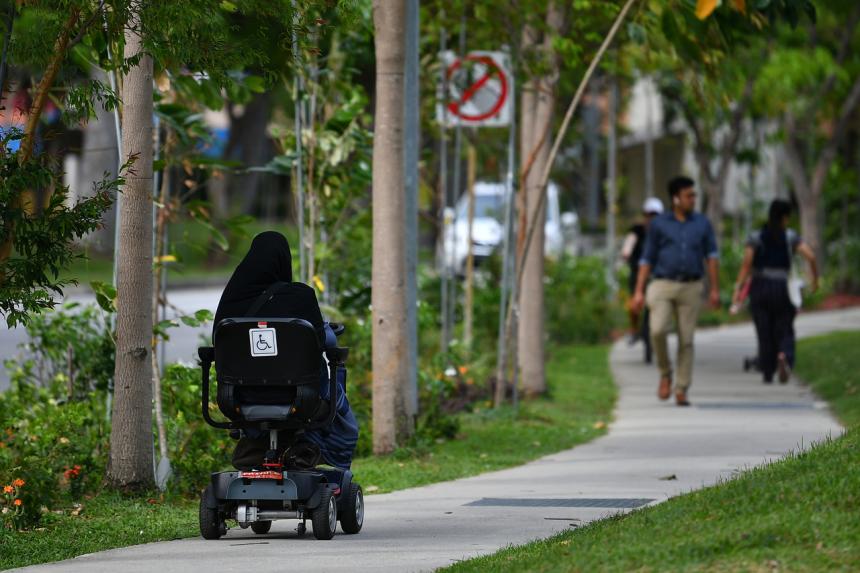SINGAPORE - Efforts have been made over the years to make Singapore more inclusive towards people with disabilities.
These include moves to provide early childhood intervention more widely, as well as making the public transport system wheelchair-friendly.
Since 2007, Singapore has had three versions of a road map with efforts laid out for five-year periods to improve the lives of people with disabilities.
The latest road map, the Enabling Masterplan 2030, is set to be unveiled later this year.
Here is a timeline of milestones in Singapore's efforts in disability inclusion.
1973: Singapore Disability Sports Council is founded.
1980: Launch of Car Park Label Scheme, providing access to wider parking spaces for drivers and passengers with mobility impairment.
1987: Central Registry of Disabled Persons closes after becoming a register of users of disability services, rather than full register of people with disabilities.
From 1991: Assessment and diagnosis units set up at KK Women's and Children's Hospital, National University Hospital and the Institute of Mental Health for early identification of developmental needs.
1999: Ministry of Education (MOE) launches Assistive Technology Fund for students in primary, secondary and pre-university levels.
2003: Compulsory Education Act comes into effect. All children born after Jan 1, 1996, except those with special needs, must attend a national primary school.
Early Intervention Programme for Infants and Children (Eipic) launched for children aged six and below who require medium to high levels of early intervention support.
2004: National Council for Social Service (NCSS) launches information portal to provide updated information and knowledge on disability types, support services, contacts and events. The portal is no longer in use.
Disability Awareness Public Education campaign launched to address attitudes and perceptions of Singaporeans towards people with disabilities.
2005: Disability Information and Referral Centre set up in March to provide one-stop information and serve as referral body for parents of newly diagnosed children.
National Institute of Education introduces compulsory 12-hour module on special needs in pre-service training for all beginning teachers.
2006: First wheelchair-accessible public bus is introduced.
Engaging Persons with Disabilities in Employment (Enable) Fund launched in July to provide funding assistance to employers who need to redesign jobs, modify workplaces or implement training when hiring people with disabilities. Later expanded to become Open Door Programme.
Ministry of Community Development, Youth and Sports (MCYS) and NCSS embark on creating inaugural Enabling Masterplan for 2007 to 2011.
2007: MOE extends special education school graduation age to 21 years for those taking mainstream secondary curriculum or pursuing vocational education programmes.
2008: Centre for Enabled Living set up by MCYS.
Mental Capacity Act passed, enabling parents to request courts to appoint trusted individuals as successor deputies to care for their child with mental disabilities when they die.

2009: MCYS, NCSS and the Insolvency and Public Trustee's Office jointly launch Special Needs Trust Company to enable parents to set aside funds to look after their children with special needs when they can no longer do so.
2011: Islandwide programme by Land Transport Authority completed, making pedestrian walkways, taxi and bus shelters, and all public roads more barrier-free.
2012: Development Support and Learning Support Programme rolled out for children who need low levels of early intervention support in pre-schools.
Singapore signs Convention on the Rights of Persons with Disabilities, and ratifies it in 2013.
Ministry of Manpower extends Workfare Income Supplement Scheme to people with disabilities.
2013: Centre for Enabled Living renamed as SG Enable.
2014: Launch of public transport concession card for people with disabilities.
New Taxi Subsidy Scheme launched to help people with disabilities who are unable to take public transport and must depend on taxis to travel to and from school, work, or employment-related training supported by SG Enable.
2015: Enabling Village in Lengkok Bahru opens as Singapore's first inclusive community space dedicated to integrating people with disabilities into the community.
2017: Introduction of para-sports to the Singapore National Games.
2018: Mayflower Primary is first designated mainstream primary school to support pupils with hearing impairment who require sign language.
All new public buses fitted with digital Passenger Information Display System to provide people with visual impairment and hearing loss better access to information.
2019: Children with special needs included in Compulsory Education Act, with first Primary 1 cohort.
Launch of Eipic Under-2s programme and Development Support-Plus programme.
Launch of Enabling Guide, a first-stop website for information on disability services.
All MRT and LRT stations and bus interchanges have at least one barrier-free access route.
2020: Launch of CareShield Life, national long-term care insurance for citizens and permanent residents born in 1980 or later who have severe disabilities.
Launch of Enabling Mark, a national-level accreditation framework to recognise disability-inclusive employers.
From Dec 1, all public buses are wheelchair-accessible.
Sign language interpretation provided for live telecasts of key national communications on television.
Empowering people with disabilities is theme for President's Challenge 2020.
2021: New Enabling Employment Credit provides up to 30 per cent wage offset for employers of people with disabilities till 2025, replacing Special Employment Credit.
Launch of three SGUnited Jobs and Skills schemes for people with disabilities - place-and-train; attach-and-train; and skills development.
2022: Seven autism spectrum disorder-specific special education schools to begin operations in phases till 2027.
By 2026: All ActiveSG gyms to become inclusive.


